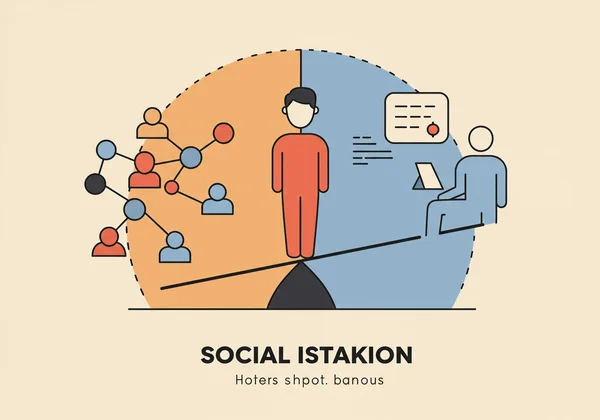Big 5 Extraversion: Gaya Sosial Anda: Kenali Diri Melalui Ujian Personaliti Big 5
Pernahkah anda tertanya-tanya mengapa sesetengah orang berkembang maju di bawah tumpuan manakala yang lain lebih suka kesunyian di tepi? Jawapannya sering terletak pada Big 5 Extraversion, ciri personaliti yang mendasar yang membentuk dunia sosial kita. Memahami kedudukan anda dalam spektrum ini boleh membuka pandangan mendalam tentang kerjaya, hubungan dan kesejahteraan peribadi anda. Tetapi pertama, apakah ujian personaliti Big 5? Ia adalah rangka kerja yang dihormati secara saintifik untuk memahami personaliti, dan mengetahui skor Extraversion anda adalah langkah pertama yang penting. Sedia untuk meneroka tenaga sosial anda? Anda boleh temui ciri personaliti Big 5 anda di platform kami.

Apakah Big 5 Extraversion?
Extraversion ialah salah satu dimensi teras personaliti yang dikenal pasti dalam Model Lima Faktor, sering diingati oleh akronim OCEAN. Ia bukanlah kes mudah sama ada anda seorang introvert atau ekstrovert; sebaliknya, ia adalah spektrum yang berterusan. Ciri ini mengukur bagaimana anda memperoleh tenaga daripada dan berinteraksi dengan dunia luar, terutamanya dalam suasana sosial. Memahami dimensi ini adalah kunci untuk menggunakan alat penilaian personaliti Big 5 untuk pembangunan peribadi.
Menentukan Dimensi Personaliti Teras Ini
Pada terasnya, Extraversion mencerminkan tahap individu itu memiliki sifat peramah, tegas, dan bersosial. Mereka yang tinggi dalam ciri ini dijana oleh interaksi sosial, manakala mereka yang rendah dalam ciri ini (sering dipanggil introvert) dijana oleh kesunyian dan refleksi senyap. Ujian personaliti Model Lima Faktor menempatkan ini sebagai aspek penting siapa diri kita, mempengaruhi pilihan, tingkah laku, dan juga kebahagiaan kita. Ia adalah bahagian asas diri anda.
Ciri-ciri Extraversion Tinggi: Si Rama-rama Sosial
Individu yang mendapat skor tinggi dalam skala Big 5 Extraversion sering menjadi nadi atau tarikan utama dalam majlis. Mereka banyak bercakap, bertenaga, dan tegas. "Rama-rama sosial" ini berasa bertenaga dengan berada di sekeliling orang lain dan sering mencari rangsangan sosial. Mereka cenderung mempunyai bulatan rakan yang luas dan berasa selesa dalam kumpulan, sering memimpin perbualan dan aktiviti. Dalam konteks profesional, mereka mungkin cemerlang dalam peranan yang melibatkan rangkaian, bercakap di khalayak ramai, atau kerja berpasukan kolaboratif.

Memahami Extraversion Rendah: Si Introvert Reflektif
Di hujung spektrum yang lain adalah mereka yang mempunyai Extraversion rendah, lebih dikenali sebagai introvert. Adalah penting untuk memahami bahawa introversi tidak sama dengan rasa malu atau keresahan sosial. Sebaliknya, ia adalah keutamaan untuk rangsangan luaran yang lebih sedikit. Introvert reflektif sering berasa penat dengan interaksi sosial yang meluas dan memerlukan masa bersendirian untuk mengecas semula bateri mereka. Mereka biasanya lebih pendiam, berfikir, dan mungkin lebih suka perbualan yang mendalam dan bermakna dengan segelintir rakan rapat berbanding perhimpunan sosial yang besar. Sifat pendiam mereka sering menjadikan mereka pendengar yang sangat baik dan pemikir yang mendalam.

Introvert vs. Ekstrovert: Menavigasi Tenaga Sosial Anda
Perdebatan popular mengenai introvert lawan ekstrovert sering mempermudah realiti yang kompleks. Kebanyakan orang bukanlah 100% satu atau yang lain. Tahap Extraversion anda menentukan "tenaga sosial" anda—bagaimana anda mendapat dan membelanjakannya. Mengenali keperluan sosial unik anda adalah langkah pertama ke arah membina kehidupan yang terasa sahih dan memuaskan. Anda boleh mengetahui lebih lanjut dengan mengambil ujian personaliti Big 5 percuma.
Melampaui Stereotaip: Nuansa Interaksi Sosial
Adalah stereotaip biasa bahawa ekstrovert sentiasa gembira dan introvert sentiasa menarik diri. Kebenarannya jauh lebih halus perinciannya. Seorang ekstrovert boleh menikmati malam yang tenang dengan buku, sama seperti seorang introvert boleh berseronok di parti. Perbezaan utama terletak pada kesan selepas itu. Ekstrovert meninggalkan parti berasa bertenaga, manakala introvert mungkin berasa terkuras dan memerlukan masa bersendirian untuk pulih. Memahami ini membantu bergerak melampaui label dan ke arah kesedaran diri yang tulen.
Ambivert: Menghubungkan Kesenjangan Antara Extraversion & Introversi
Bagaimana jika anda tidak merasa seperti ekstrovert atau introvert tulen? Anda mungkin seorang ambivert. Ambivert jatuh di suatu tempat di tengah spektrum Extraversion dan menunjukkan keseimbangan kedua-dua ciri. Mereka menikmati situasi sosial tetapi juga menghargai masa bersendirian mereka. Fleksibiliti ini boleh menjadi kekuatan besar, membolehkan mereka menyesuaikan diri dengan pelbagai konteks sosial dengan mudah. Mereka boleh menjadi ahli perbualan yang hebat tetapi juga selesa dengan kesunyian. Mengambil ujian personaliti Big 5 saintifik boleh mendedahkan di mana anda berada dalam spektrum ini.

Bagaimana Extraversion Mempengaruhi Kehidupan Anda
Skor anda pada skala Big 5 Extraversion mempunyai implikasi yang luas, mempengaruhi segala-galanya daripada laluan kerjaya anda kepada hubungan terdekat anda. Dengan memahami ciri ini, anda boleh membuat keputusan yang lebih termaklum yang selari dengan kecenderungan semula jadi anda, membawa kepada kejayaan yang lebih besar dan kepuasan peribadi. Mendapatkan keputusan ujian personaliti Big 5 anda boleh menyediakan peta jalan yang jelas untuk perjalanan ini.
Extraversion di Tempat Kerja: Dinamik Pasukan dan Kepimpinan
Dalam persekitaran profesional, kedua-dua Extraversion tinggi dan rendah mempunyai kelebihan yang berbeza. Ekstrovert selalunya cemerlang dalam kepimpinan, jualan, dan peranan yang berurusan secara langsung dengan orang ramai di mana ketegasan dan kesosialan mereka bersinar. Mereka boleh menjana pasukan dan membina rangkaian yang luas. Sebaliknya, introvert sering berkembang maju dalam peranan yang memerlukan tumpuan mendalam, analisis, dan interaksi satu lawan satu. Pendekatan mereka yang berfikir menjadikan mereka penyelidik, penulis, dan perancang strategik yang cemerlang. Bagi profesional HR, memahami dinamik pasukan melalui lensa Extraversion boleh membawa kepada kerjasama yang lebih berkesan.
Menavigasi Hubungan dengan Tenaga Sosial yang Berbeza
Kesalahpahaman dalam hubungan sering timbul akibat perbezaan keperluan tenaga sosial. Pasangan ekstrovert mungkin berasa tidak disayangi apabila pasangan introvert mereka memerlukan malam yang tenang di rumah. Sebaliknya, seorang introvert mungkin berasa terharu dengan jadual sosial pasangan ekstrovert mereka yang sibuk. Mengiktiraf bahawa ini hanyalah cara berbeza untuk menjadi—bukan penolakan peribadi—boleh memupuk empati dan komunikasi yang lebih sihat. Ia membolehkan pasangan menghormati keperluan masing-masing untuk kedua-dua sambungan dan kesunyian.
Memupuk Tenaga Sosial Anda untuk Pertumbuhan Peribadi
Mengenali diri sendiri memberi anda kelebihan yang amat besar. Jika anda seorang ekstrovert, anda boleh belajar menjadualkan masa rehat untuk mengelakkan keletihan. Jika anda seorang introvert, anda boleh merancang acara sosial secara strategik supaya anda mempunyai tenaga yang cukup untuk menikmatinya dan pulih selepas itu. Matlamatnya bukan untuk mengubah siapa diri anda tetapi untuk bekerja dengan personaliti semula jadi anda. Ini memperkasakan anda untuk menguruskan tenaga anda dengan berkesan, mengurangkan tekanan, dan berinteraksi dengan dunia mengikut syarat anda sendiri. Sedia untuk mengetahui lebih lanjut? Dapatkan pandangan Big 5 peribadi hari ini.
Hayati Big 5 Extraversion Anda: Laluan Anda ke Kesedaran Diri
Akhirnya, sama ada anda cenderung kepada ekstrovert, introvert, atau di suatu tempat di antaranya, ciri Big 5 Extraversion anda adalah bahagian yang kuat dari identiti unik anda. Hayati gaya sosial semula jadi anda – tiada cara yang 'betul' atau 'salah' untuk menjadi. Kesedaran diri ini memperkasakan anda untuk memilih kerjaya yang memuaskan, mengukuhkan hubungan anda, dan mengamalkan penjagaan diri yang berkesan.
Sedia untuk mengambil langkah seterusnya dalam memahami diri anda? Ambil ujian personaliti Big 5 percuma kami sekarang dan terima keputusan segera yang menerangi laluan anda ke hadapan.
Soalan Lazim
Apakah ujian personaliti Big 5?
Ujian personaliti Big 5 ialah penilaian psikologi yang komprehensif dan disahkan secara saintifik. Ia mengukur personaliti individu di seluruh lima dimensi teras: Keterbukaan, Kesedaran, Extraversion, Persetujuan, dan Neurotikisme (OCEAN). Tidak seperti banyak kuiz personaliti lain, Big 5 digunakan secara meluas dalam penyelidikan akademik dan dianggap sebagai model yang boleh dipercayai dan tepat untuk memahami struktur personaliti.
Apakah lima faktor Big 5?
Lima faktor, atau dimensi, ialah:
- Keterbukaan: Kecenderungan untuk menjadi imaginatif dan ingin tahu berbanding dengan praktikal dan berhati-hati.
- Kesedaran: Kecenderungan untuk menjadi teratur dan disiplin berbanding dengan santai dan spontan.
- Extraversion: Kecenderungan untuk menjadi bersosial dan bertenaga berbanding dengan bersendirian dan pendiam.
- Persetujuan: Kecenderungan untuk menjadi penyayang dan bekerjasama berbanding dengan curiga dan antagonistik.
- Neurotikisme: Kecenderungan untuk mengalami emosi negatif, seperti kebimbangan dan kesedihan, berbanding dengan stabil secara emosi dan tahan lasak.
Sejauh manakah ketepatan ujian personaliti Big 5?
Ujian personaliti Big 5 ialah salah satu penilaian personaliti yang paling boleh dipercayai dan tepat yang tersedia. Kesahihannya disokong oleh penyelidikan psikologi selama berdekad-dekad merentasi pelbagai budaya dan populasi. Walaupun tiada ujian yang 100% sempurna, Big 5 menyediakan ukuran yang sangat kredibel dan konsisten bagi ciri-ciri personaliti teras, menjadikannya alat yang dipercayai untuk penemuan peribadi dan kegunaan profesional.
Bagaimana saya boleh menggunakan keputusan Big 5 saya?
Anda boleh menggunakan keputusan Big 5 anda untuk mendapatkan kesedaran diri yang mendalam dan mendorong pertumbuhan peribadi. Memahami ciri anda boleh membantu anda mengenal pasti laluan kerjaya yang ideal, meningkatkan komunikasi dalam hubungan anda, dan mengenali kekuatan dan cabaran semula jadi anda. Untuk strategi yang lebih terperinci, laporan berkuasa AI pilihan kami menawarkan nasihat peribadi yang boleh diambil tindakan yang disesuaikan dengan profil personaliti unik anda. Anda boleh buka kunci laporan anda selepas melengkapkan ujian percuma.